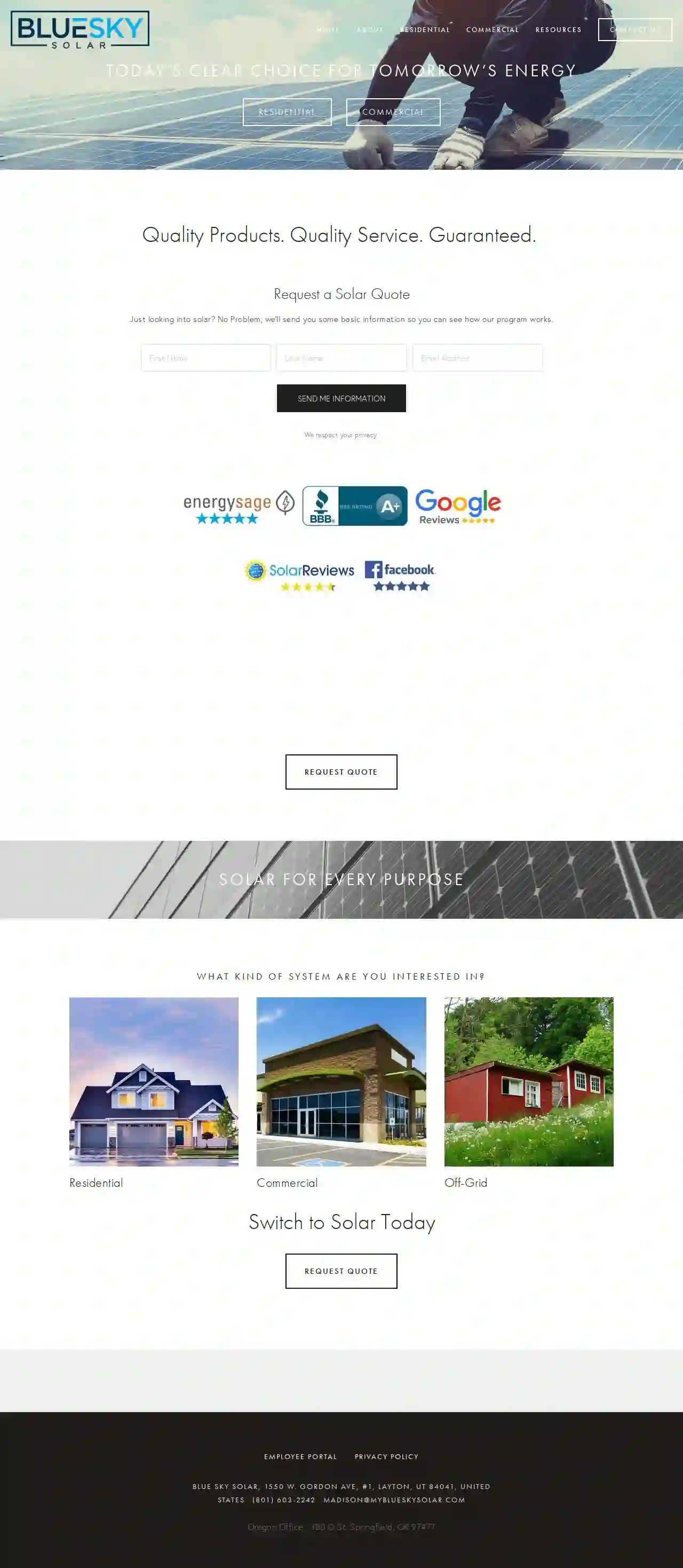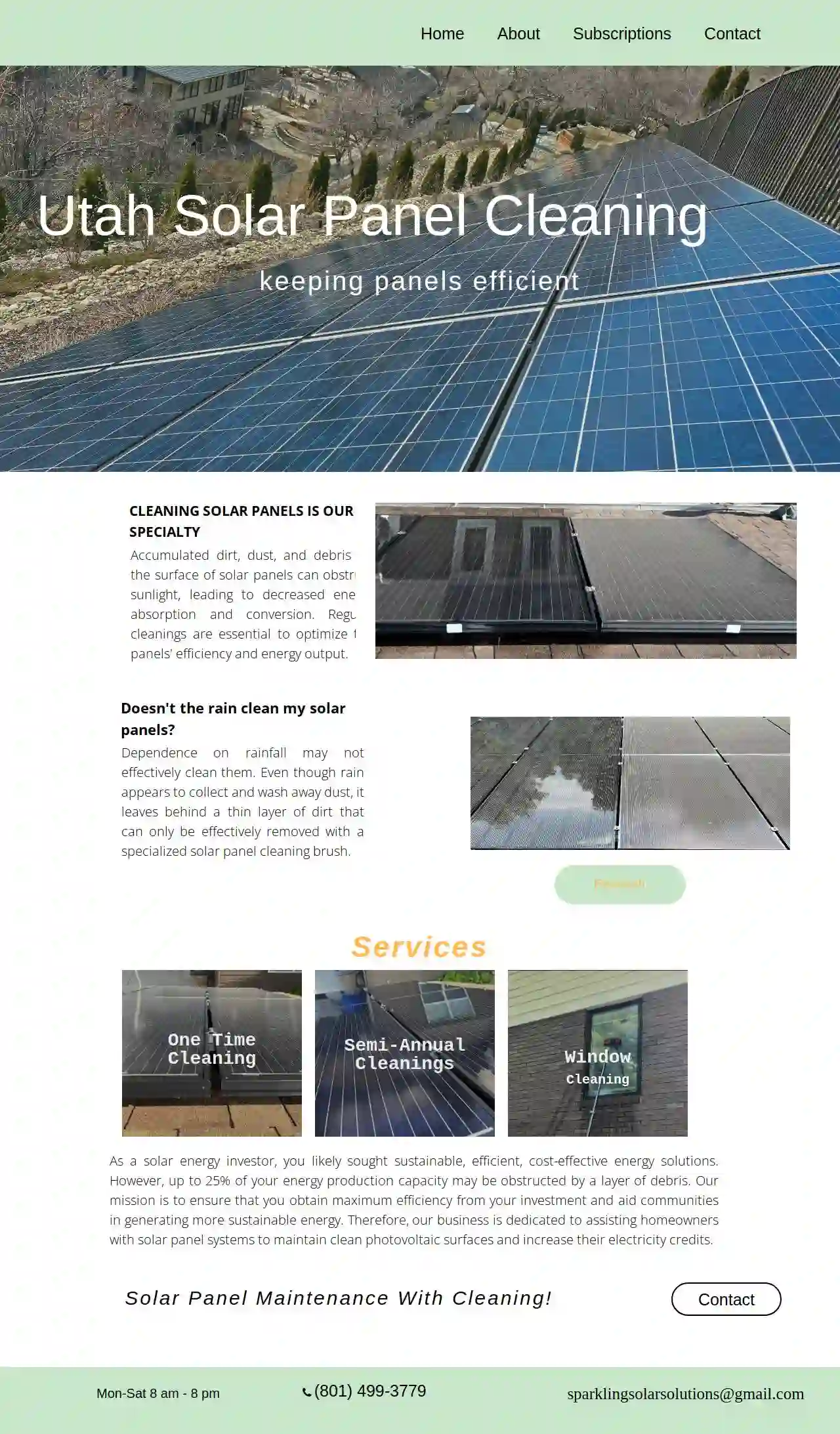Solar Installers Maeser
Find the best Solar Panels For Homes in Maeser
Receive up to 3 Solar Company quotes for your project today! Compare profiles, reviews, accreditations, portfolio, etc... and choose the best deal.

Mūv Power
510 reviews1234 Solar Way, N/A, Alpine, 84104, USMuv Power is a company dedicated to helping families achieve financial freedom and independence through the use of clean energy. Their mission is to positively impact the lives of their employees and customers by creating an unmatched culture built around honesty, joy, hard work, and a strong work-life balance. They aim to become the most profitable clean energy company through a complete vertical integration.
- Services
- Why Us?
- Accreditations
- Our Team
- Testimonials
- Gallery
Get Quote
Blue Sky Solar, LLC
4.927 reviews1550 W. Gordon Ave, #1, Layton, 84041, USBlue Sky Solar is a leading provider of solar energy solutions, offering a range of services including residential and commercial solar installations, solar financing, and products and warranties. With a focus on staying current with technology and embracing a wider view of renewable energy, Blue Sky Solar sets itself apart from other companies in the industry. The company has built relationships with top manufacturers, allowing them to offer quality products and competitive pricing. Local installation teams ensure that clients receive the best care possible for their renewable energy needs.
- Services
- Why Us?
- Accreditations
- Our Team
- Testimonials
- Gallery
Get Quote
eHome By Design (Utah Solar Company)
53 reviews123 Solar Way, Orlando, 32132, USeHomeByDesign is the Solar Energy Company to Save You Thousands! Get Free Quote! Solar Power Utah, Arizona and Florida. Save Now & Go Solar with no money down. With our No Money Down Program you make the same payment until your solar system is paid off, instead of paying an ever-increasing electric bill. Solar has never been more affordable. Solar equipment costs have fallen & tax incentives and a Federal rebate of up to 30% make solar more affordable than ever. Produce Your Own Power. By “Going Solar” you are beating the trend and setting an example for your family, friends and neighbors, by generating you power directly from the sun. Save Money. Owning your own solar system can save you thousands of dollars over time. Solar is a fixed cost that can be paid off, but a power bill is forever. Earth Friendly. Energy is dominated by earth-endangering processes like coal and nuclear power. Solar energy is clean, efficient and draws power directly from the sun. Tax Incentives. The cost of your solar system is currently backed by federal and state tax incentives. But these incentives won’t last forever – now is the time to invest in solar. About eHomeByDesign. Who is Ehome by Design? We are a collection of professionals who focus on customer satisfaction and making the future a better, greener place through solar energy. We don’t just stop there, we also provide homeowners with LED Lighting, Alarm Systems and Security Cameras and many more upgrades, to truly bring you an amazing eHome experience. The best part it that all of these upgrades can be wrapped into your solar loan for one low easy monthly payment!
- Services
- Why Us?
- Accreditations
- Our Team
- Testimonials
- Gallery
Get Quote
Green RV Solutions
2445 Anne Ave, West Haven, 84401, USGreen RV Solutions is a veteran-owned business dedicated to providing affordable RV repair services and off-grid systems with battery. Our mission is to enhance outdoor experiences by eliminating the need for loud, smelly generators. We offer personalized installation services and come to you, ensuring hassle-free RV maintenance.
- Services
- Why Us?
- Our Team
- Testimonials
- Gallery
Get Quote
Utah Solar Panel Cleaning
53 reviews123 Solar Way, Suite 100, Salt Lake City, 84101, USUT Solar Panel Cleaning is a leading provider of solar panel cleaning services in the Utah area. Our mission is to ensure that your solar panels are operating at their maximum efficiency. We have a team of experienced professionals who use state-of-the-art equipment to clean your solar panels. Our services include residential and commercial solar panel cleaning, as well as solar panel maintenance and repair. We are fully accredited and insured, and we have been in business for over 15 years.
- Services
- Why Us?
- Accreditations
- Our Team
- Testimonials
Get Quote
Solar Broker
123 Solar Way, Beverly Hills, 90210, USConnect Your Solar is a leading provider of solar panel installation services, dedicated to helping homeowners and businesses harness the power of the sun to save on energy costs. With a team of experienced professionals and a commitment to quality, we offer comprehensive solutions for all your solar needs. Our mission is to make solar energy accessible and affordable for everyone, promoting a greener future for our planet.
- Services
- Why Us?
- Accreditations
- Our Team
- Testimonials
Get Quote
Red Peak Solar
534 reviews123 Solar Way, Suite 100, Beverly Hills, 90210, USRed Peak Solar is a leading provider of solar energy solutions, dedicated to helping homeowners and businesses harness the power of the sun to save money and reduce their carbon footprint. With a team of experienced professionals and a commitment to quality, Red Peak Solar offers a range of services including solar panel installation, maintenance, and repair. Their mission is to make solar energy accessible and affordable for everyone, while promoting a sustainable future.
- Services
- Why Us?
- Accreditations
- Our Team
- Testimonials
Get Quote
Солнечные панели США
Salt Lake City, USSkip to content Все о Солнечных Панелях Индивидуальный Дизайн Cравнить Предложения Menu Все о Солнечных Панелях Индивидуальный Дизайн Cравнить Предложения Все о солнечных панелях в США принципы работы доступные субсидии предложения от разных компаний онлайн Со специалистом Самостоятельно Рассказываем Актуальная Информация Солнечные панели – все, что нужно знать на сегодняшний день. Из проверенных источников Показываем Индивидуальные расчеты Солнечные панели для дома и бизнеса. С учетом необходимости, бюджета и установки настроек Отбираем Предложения на Рынке От квалифицированных компаний в вашем городе Все о панеляхДля тех кто в начале пути. Общие принципы работы, субсидии, технические характеристики, батареи Learn More Бесплатные консультациисохраните время на поиск информации - задайте интересующие вас вопросы одному из наших специалистов Learn More индивидуальный дизайнДетальный расчет и дизайн системы панелей для вашего дома или бизнеса Learn More сравнить предложенияКвалифицированные компании соревнуются за ваш проект. Сравните предложеиня не выходя из дома Learn More Полная поддержкаМы следим за всеми этапами проекта и оказываем поддержку до и после того как ваша система включена Learn More Выбери Лучшеe Наша платформа помогает сравнить предложения квалифицированных компаний. Они дают свои предложения, не имея доступ к вашей контактной информации – мы сравниваем оборудование, гарантии, цены и показываем вам самые оптимальные варинты Остались вопросы? Заполни форму и наши специалисты с радостью на них ответят задать вопрос специалисту 801-913-3039 [email protected] 370 S 300 E, Salt Lake City, UT Плюсы Солнечных Панелей О нас Услуги Privacy Policy Медийным партнерам Сотрудничество © All rights reserved SolarPanelsInRussian, 2020 Бесплатная консультация Узнай как панели будут работать для тебя Zip Code First and Last Name Phone Number send feedback Full Name Email Guide Download Скачать
- Services
- Why Us?
- Gallery
Get Quote
Sun Powered Nomads
59 reviews123 Adventure Lane, Adventure City, 12345, USSun Powered Nomads is dedicated to helping you experience your outdoor adventure worry-free. We specialize in DIY Van Electrical Installations, RV Solar Panel Installs, Cell Boosters, and Lithium Battery upgrades. Our founder, Ty Gunnlaugsson, has a passion for exploring the outdoors and has learned a lot living off-grid for the past 2.5 years. He has helped dozens of people spec out and even build their dream van.
- Services
- Why Us?
- Accreditations
- Our Team
- Testimonials
- Gallery
Get Quote
Creative Energies
4.971 reviewsLander, Wyoming, 1623 Hwy 287, 82520, USCreative Energies is a leading provider of solar energy solutions, offering a range of services including residential, commercial, and off-grid solar systems. With over 20 years of experience, they have established a reputation for professionalism, quality, and customer satisfaction. Their team of experts is dedicated to helping clients navigate the process of transitioning to solar energy, from initial consultation to installation and maintenance.
- Services
- Why Us?
- Accreditations
- Our Team
- Testimonials
- Gallery
Get Quote
Over 4,210+ Solar Installers onboarded
Our solar installers operate in Maeser & surrounding areas!
SolarCompaniesHub has curated and vetted Top Solar Installers near Maeser. Find a top & trustworthy contractor today.
Frequently Asked Questions About Solar Installers
- Use a Directory Like SolarCompaniesHub: We connect you with pre-screened, qualified solar installers in your area.
- Check Online Reviews: Look for positive reviews on Google, Yelp, and other reputable sources.
- Ask for Referrals: Get recommendations from friends, family, or neighbors who have gone solar.
- Verify Credentials: Ensure the installer is licensed, insured, and certified by reputable organizations (e.g., NABCEP in the US).
- Get Multiple Quotes: Compare quotes from at least 3-4 installers to find the best value for your project.
- Ask Questions: Don't hesitate to ask installers about their experience, warranties, and the process they follow.
- Draw electricity from the grid when your solar panels aren't producing enough power (e.g., at night)
- Sell excess solar electricity back to the grid through net metering.
Can I go completely off-grid with solar panels?
Do I need planning permission to install solar panels in USA?
How do I find a good solar installer near me?
What is the difference between grid-tied and off-grid solar systems?
Can I go completely off-grid with solar panels?
Do I need planning permission to install solar panels in USA?
How do I find a good solar installer near me?
- Use a Directory Like SolarCompaniesHub: We connect you with pre-screened, qualified solar installers in your area.
- Check Online Reviews: Look for positive reviews on Google, Yelp, and other reputable sources.
- Ask for Referrals: Get recommendations from friends, family, or neighbors who have gone solar.
- Verify Credentials: Ensure the installer is licensed, insured, and certified by reputable organizations (e.g., NABCEP in the US).
- Get Multiple Quotes: Compare quotes from at least 3-4 installers to find the best value for your project.
- Ask Questions: Don't hesitate to ask installers about their experience, warranties, and the process they follow.
What is the difference between grid-tied and off-grid solar systems?
- Draw electricity from the grid when your solar panels aren't producing enough power (e.g., at night)
- Sell excess solar electricity back to the grid through net metering.